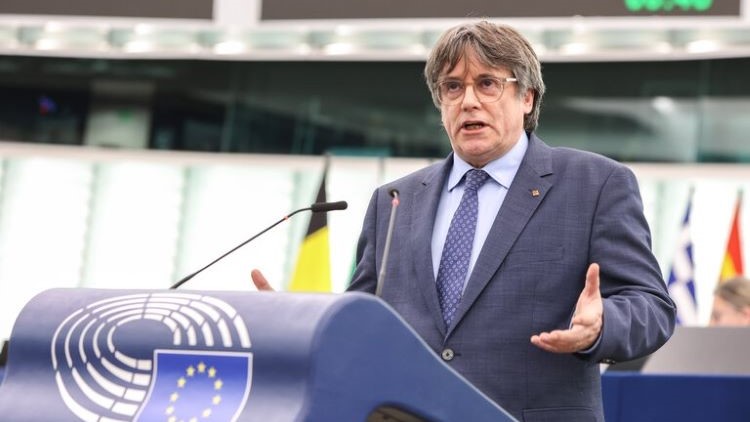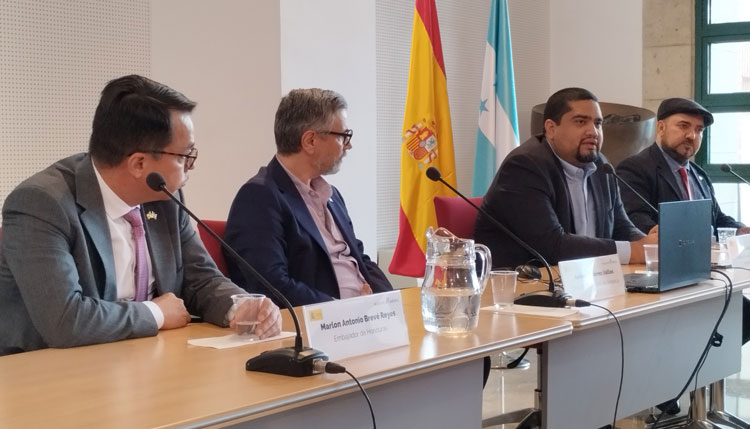Eduardo González
The European Parliament yesterday urged EU leaders and member states to respond to Russian interference “with the necessary sense of urgency and determination” and called for an investigation into any possible connection of MEPs with Russia, including meetings of the Former Catalan president Carles Puigdemont with a former Russian diplomat on the eve of the 2017 referendum.
With 429 votes in favor, 27 against and 48 abstentions (including those of Jorge Buxadé, head of the Spanish delegation in the ERC group, and Margarita Pisa, also from Vox), the last plenary session of the European Parliament before the European elections, held in Strasbourg, carried out a non-binding resolution in which it shows its “dismay” at the “Kremlin-sponsored operations to interfere with and undermine democratic processes in Europe” and at the “credible” accusations about MEPs who received money in exchange to spread Russian propaganda.
The text also alludes to the participation of MEPs in the pro-Russian media outlet Voice of Europe, “while Russia continues its illegal war of aggression against Ukraine.” Likewise, it warns of the need to investigate all connections of MEPs allegedly related to the Kremlin and regrets the attacks against the judges who have undertaken this task. For all these reasons, the MEPs ask that the leaders of the EU and its member states confront Russian interference and underline “the urgency and determination necessary in view of the proximity of the European elections of June 6 to 9.”
The text also alludes to the “alleged intense contacts” between “agents responsible for Russian interference” and a “Catalan secessionist group”, including “the holding of a meeting between the former Russian diplomat Nikolai Sadovnikov and the then separatist leader and former president of Catalonia , the now sitting MEP Carles Puigdemont, in Barcelona, on the eve of the illegal Catalan referendum of October 2017 (popularly known as 1-O).”
The part of the text related to Catalonia was approved with 365 votes in favor, 52 against (including those of the former Catalan councilor Clara Ponsatí, the Podemos parliamentarians María Eugenia Rodríguez Palop, Patricia Caro, Esther Sanz Selva, Miguel Urbán and Idoia Vilanueva, Jordi Solé, from ERC, and Ana Miranda, from the BNG) and 90 abstentions.
After the approval, the vice president of the Group of the European People’s Party, Dolors Montserrat, recalled that “the fugitive Puigdemont, who is now a candidate for president of the Generalitat, has already been the focus of several resolutions of the European Parliament due to his contacts with agents Russians during the independence process.” Puigdemont has already announced that he will leave the European Parliament to run for the Presidency of the Generalitat in the Catalan elections on May 12.
The February resolution
Indeed, on February 8, the European Parliament approved, by a large majority, a resolution (consensus by the majority of the groups in the Chamber, from the popular to the socialists and the greens), by which the European Parliament was “extremely concerned about the relations between the Catalan secessionists and the Russian administration.”
Likewise, it noted that “Russian interference in Catalonia is part of a broader Russian strategy to promote internal destabilization and disunity in the EU” and expressed its “deep concern about the massive disinformation campaigns that Russia has carried out in Catalonia.” , as well as the intense contacts and the number of meetings between the agents responsible for Russian interference in the independence movement and the government of the Autonomous Community of Catalonia.
That text also made a direct reference to Carles Puigdemont after the approval of two amendments from the Popular Party to include the resolution. Specifically, he warned that, according to certain information, Nikolai Sadovnikov had met with the former president of the Generalitat in Barcelona “on the eve of the illegal referendum in Catalonia in October 2017.”
That resolution also asked “the competent Spanish authorities to continue, intensify and quickly conclude their investigations into the reported cases of interference by Russia, particularly those linked to Catalan secessionist groups,” and regretted “the attacks on the judges investigating these interference activities.”







